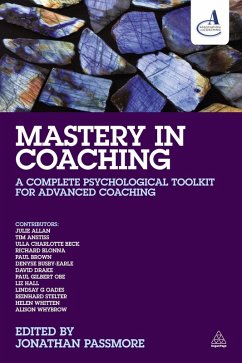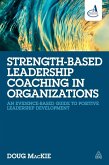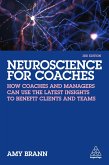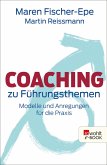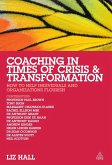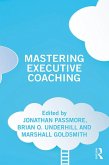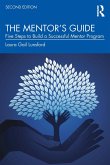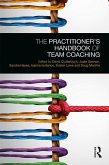Mastery in Coaching (eBook, ePUB)
A Complete Psychological Toolkit for Advanced Coaching
Redaktion: Passmore, Jonathan
27,95 €
27,95 €
inkl. MwSt.
Sofort per Download lieferbar

14 °P sammeln
27,95 €
Als Download kaufen

27,95 €
inkl. MwSt.
Sofort per Download lieferbar

14 °P sammeln
Jetzt verschenken
Alle Infos zum eBook verschenken
27,95 €
inkl. MwSt.
Sofort per Download lieferbar
Alle Infos zum eBook verschenken

14 °P sammeln
Mastery in Coaching (eBook, ePUB)
A Complete Psychological Toolkit for Advanced Coaching
Redaktion: Passmore, Jonathan
- Format: ePub
- Merkliste
- Auf die Merkliste
- Bewerten Bewerten
- Teilen
- Produkt teilen
- Produkterinnerung
- Produkterinnerung

Bitte loggen Sie sich zunächst in Ihr Kundenkonto ein oder registrieren Sie sich bei
bücher.de, um das eBook-Abo tolino select nutzen zu können.
Hier können Sie sich einloggen
Hier können Sie sich einloggen
Sie sind bereits eingeloggt. Klicken Sie auf 2. tolino select Abo, um fortzufahren.

Bitte loggen Sie sich zunächst in Ihr Kundenkonto ein oder registrieren Sie sich bei bücher.de, um das eBook-Abo tolino select nutzen zu können.
The reasons that coaching works so well and can produce such dramatic results are grounded in psychology, so it follows that some of the most powerful coaching methods available draw on psychological thinking. Published with the Association for Coaching, Mastery in Coaching presents the latest thinking on the most effective techniques coaches can use with their clients. Every chapter is written by a leading expert in the field, and takes a rigorous, evidence-based approach which will give you a practical understanding of each method, supported with examples, and underpinned by the theory of…mehr
- Geräte: eReader
- mit Kopierschutz
- eBook Hilfe
- Größe: 1.63MB
- FamilySharing(5)
Andere Kunden interessierten sich auch für
![Strength-Based Leadership Coaching in Organizations (eBook, ePUB) Strength-Based Leadership Coaching in Organizations (eBook, ePUB)]() Doug MackieStrength-Based Leadership Coaching in Organizations (eBook, ePUB)29,95 €
Doug MackieStrength-Based Leadership Coaching in Organizations (eBook, ePUB)29,95 €![Neuroscience for Coaches (eBook, ePUB) Neuroscience for Coaches (eBook, ePUB)]() Amy BrannNeuroscience for Coaches (eBook, ePUB)27,95 €
Amy BrannNeuroscience for Coaches (eBook, ePUB)27,95 €![Coaching zu Führungsthemen (eBook, ePUB) Coaching zu Führungsthemen (eBook, ePUB)]() Maren Fischer-EpeCoaching zu Führungsthemen (eBook, ePUB)9,99 €
Maren Fischer-EpeCoaching zu Führungsthemen (eBook, ePUB)9,99 €![Coaching in Times of Crisis and Transformation (eBook, ePUB) Coaching in Times of Crisis and Transformation (eBook, ePUB)]() Liz HallCoaching in Times of Crisis and Transformation (eBook, ePUB)29,95 €
Liz HallCoaching in Times of Crisis and Transformation (eBook, ePUB)29,95 €![Mastering Executive Coaching (eBook, ePUB) Mastering Executive Coaching (eBook, ePUB)]() Mastering Executive Coaching (eBook, ePUB)39,95 €
Mastering Executive Coaching (eBook, ePUB)39,95 €![The Mentor's Guide (eBook, ePUB) The Mentor's Guide (eBook, ePUB)]() Laura Gail LunsfordThe Mentor's Guide (eBook, ePUB)64,95 €
Laura Gail LunsfordThe Mentor's Guide (eBook, ePUB)64,95 €![The Practitioner's Handbook of Team Coaching (eBook, ePUB) The Practitioner's Handbook of Team Coaching (eBook, ePUB)]() The Practitioner's Handbook of Team Coaching (eBook, ePUB)142,95 €
The Practitioner's Handbook of Team Coaching (eBook, ePUB)142,95 €-
-
-
The reasons that coaching works so well and can produce such dramatic results are grounded in psychology, so it follows that some of the most powerful coaching methods available draw on psychological thinking. Published with the Association for Coaching, Mastery in Coaching presents the latest thinking on the most effective techniques coaches can use with their clients. Every chapter is written by a leading expert in the field, and takes a rigorous, evidence-based approach which will give you a practical understanding of each method, supported with examples, and underpinned by the theory of the key psychological concepts in coaching. Ranging from cognitive-behavioural coaching, gestalt and positive psychology to neuroscience and mindfulness, this indispensable book will give any serious coach the tools they need to get the best from their clients.
Produktdetails
- Produktdetails
- Verlag: Kogan Page eBook
- Seitenzahl: 344
- Erscheinungstermin: 3. September 2014
- Englisch
- ISBN-13: 9780749471804
- Artikelnr.: 41838401
- Verlag: Kogan Page eBook
- Seitenzahl: 344
- Erscheinungstermin: 3. September 2014
- Englisch
- ISBN-13: 9780749471804
- Artikelnr.: 41838401
- Herstellerkennzeichnung Die Herstellerinformationen sind derzeit nicht verfügbar.
Jonathan Passmore is an occupational psychologist and a coaching supervisor. He has wide business consulting experience, having worked for PricewaterhouseCoopers and IBM Business Consulting, and as a chief executive and company chairman in the sports leisure sector. He is based at the School of Psychology, University of East London, and is Director for the Coaching and Coaching Psychology programs. He is co-author of Appreciative Inquiry for Change Management and Top Business Psychology Models, and he is editor of Excellence in Coaching, Diversity in Coaching and Psychometrics in Coaching (Kogan Page). Contributors: Julie Allan, Chartered and Registered Psychologist Tim Anstiss, Medical doctor Ulla Beck, Author of "Psychodynamic Coaching: Focus and depth" Rich Blonna, Professor of Public Health at William Paterson University Paul Brown, Specialist in applied neuroscience in organizations Denyse Busby-Earle, Accredited NLP practitioner David Drake, Executive Director of the Center for Narrative Coaching & Leadership Paul Gilbert, Professor of Clinical Psychology at the University of Darby Liz Hall, Author of "Mindful Coaching" Lindsay G Oades, Director of the Australian Institute of Business Wellbeing Reinhard Stelter, Professor of Sport and Coaching Psychology at the University of Copenhagen Helen Whitten, Accredited coach Alison Whybrow, Chartered and Registered Psychologist
About the contributors
Foreword by Carol Kauffman
01 Mastery in coaching
Jonathan Passmore
Introduction
What is mastery in coaching?
Evidence-based practice
Conclusion
References
02 Positive psychology coaching
Lindsay G Oades and Jonathan Passmore
Introduction
Theory and evidence underpinning positive psychology coaching
The aims and processes of positive psychology coaching
Practice: tools and techniques
When might positive psychology coaching be most suitable?
Conclusion
Developing yourself as an positive psychology coach
References
03 Psychodynamic coaching
Ulla Beck
Introduction
The theoretical foundations
Psychodynamic personality and developmental psychology
Psychodynamic group psychology
Psychodynamic organizational psychology: the system theory
Practice in psychodynamic coaching
Practice: tools and techniques
The future: the expectation of what is to come and what is desired
Primary task and role for the coach and client or client group
Conclusions, evaluation and leave-taking
When does psychodynamic coaching work best?
Conclusion
Developing yourself as a psychodynamic coach
References
04 Narrative coaching
David Drake and Reinhard Stelter
Introduction
Evidenced-based approach to narrative coaching
Practices: tools and techniques
Suitability
Conclusion
Developing yourself as a narrative coach
References
Notes
05 Gestalt approaches
Alison Whybrow and Julie Allan
Introduction
The development of gestalt coaching
The evidence base of gestalt coaching
Practice: tools and techniques
Three practices
Selfing
When might a gestalt approach be most suitable?
Conclusions
Developing yourself as a gestalt coach
References
06 Neurobehavioural modelling: applying neuroscience research to the
development of coaching practice
Paul Brown and Denyse Busby-Earle
Introduction
Evidence based approach to neuro-behavioural modelling
Coaching and the practice of NBM
When might this approach be most suitable?
Conclusion
References
Notes
07 Cognitive behavioural coaching
Helen Whitten
Introduction
Evidenced-based approach to CBC
Practice: CBC tools and techniques
Initiating the coaching programme
Preparing the ground for coaching
Developing client awareness of cognitive habits
Challenging and reframing unhelpful thoughts and behaviours
Socratic questioning
Developing new approaches to problem situations
Reviewing and integrating change
When might CBC approach be most suitable?
Conclusions
Developing yourself as a cognitive behavioural coach
References
08 Mindful coaching
Liz Hall
Introduction
Evidenced-based approach to mindful coaching
A multifaceted phenomena
The research
Coaching-related research
Goal-free coaching?
Practice: tools and techniques in mindful coaching
Mindful sessions
Core mindful practices
Suggested applications of specific mindfulness practices
Introducing and adapting mindfulness to clients
Cultural context
When might the MC approach be most suitable?
Conclusion
Developing yourself as a mindful coach
References
09 Compassionate mind coaching
Tim Anstiss and Paul Gilbert
Introduction
Evidenced-based approach to compassionate mind coaching
Theoretical and practice
Tools and techniques
When might compassionate mind coaching be most suitable?
Conclusion
Developing yourself as a compassionate mind coach
References
10 Acceptance and commitment coaching
Tim Anstiss and Rich Blonna
Introduction
Evidenced-based approach to AC coaching
Acceptance and mindfulness
Pragmaticism
Relational Frame Theory
Evidence
Practice: tools and techniques
The Ramp Model of AC coaching
When might AC coaching be most suitable?
Conclusions
Developing yourself as an Acceptance and Commitment Coach
References
11 Motivational interviewing
Jonathan Passmore
Introduction
The evidence base for motivational interviewing
The theory behind MI
Does MI work?
The active ingredients within MI
Practice: tools and techniques
The spirit of the approach
The principles
The core skills (or micro-skills)
Tools and techniques
When might MI be the most suitable?
Conclusions
Developing yourself as an MI coach
References
Index
Foreword by Carol Kauffman
01 Mastery in coaching
Jonathan Passmore
Introduction
What is mastery in coaching?
Evidence-based practice
Conclusion
References
02 Positive psychology coaching
Lindsay G Oades and Jonathan Passmore
Introduction
Theory and evidence underpinning positive psychology coaching
The aims and processes of positive psychology coaching
Practice: tools and techniques
When might positive psychology coaching be most suitable?
Conclusion
Developing yourself as an positive psychology coach
References
03 Psychodynamic coaching
Ulla Beck
Introduction
The theoretical foundations
Psychodynamic personality and developmental psychology
Psychodynamic group psychology
Psychodynamic organizational psychology: the system theory
Practice in psychodynamic coaching
Practice: tools and techniques
The future: the expectation of what is to come and what is desired
Primary task and role for the coach and client or client group
Conclusions, evaluation and leave-taking
When does psychodynamic coaching work best?
Conclusion
Developing yourself as a psychodynamic coach
References
04 Narrative coaching
David Drake and Reinhard Stelter
Introduction
Evidenced-based approach to narrative coaching
Practices: tools and techniques
Suitability
Conclusion
Developing yourself as a narrative coach
References
Notes
05 Gestalt approaches
Alison Whybrow and Julie Allan
Introduction
The development of gestalt coaching
The evidence base of gestalt coaching
Practice: tools and techniques
Three practices
Selfing
When might a gestalt approach be most suitable?
Conclusions
Developing yourself as a gestalt coach
References
06 Neurobehavioural modelling: applying neuroscience research to the
development of coaching practice
Paul Brown and Denyse Busby-Earle
Introduction
Evidence based approach to neuro-behavioural modelling
Coaching and the practice of NBM
When might this approach be most suitable?
Conclusion
References
Notes
07 Cognitive behavioural coaching
Helen Whitten
Introduction
Evidenced-based approach to CBC
Practice: CBC tools and techniques
Initiating the coaching programme
Preparing the ground for coaching
Developing client awareness of cognitive habits
Challenging and reframing unhelpful thoughts and behaviours
Socratic questioning
Developing new approaches to problem situations
Reviewing and integrating change
When might CBC approach be most suitable?
Conclusions
Developing yourself as a cognitive behavioural coach
References
08 Mindful coaching
Liz Hall
Introduction
Evidenced-based approach to mindful coaching
A multifaceted phenomena
The research
Coaching-related research
Goal-free coaching?
Practice: tools and techniques in mindful coaching
Mindful sessions
Core mindful practices
Suggested applications of specific mindfulness practices
Introducing and adapting mindfulness to clients
Cultural context
When might the MC approach be most suitable?
Conclusion
Developing yourself as a mindful coach
References
09 Compassionate mind coaching
Tim Anstiss and Paul Gilbert
Introduction
Evidenced-based approach to compassionate mind coaching
Theoretical and practice
Tools and techniques
When might compassionate mind coaching be most suitable?
Conclusion
Developing yourself as a compassionate mind coach
References
10 Acceptance and commitment coaching
Tim Anstiss and Rich Blonna
Introduction
Evidenced-based approach to AC coaching
Acceptance and mindfulness
Pragmaticism
Relational Frame Theory
Evidence
Practice: tools and techniques
The Ramp Model of AC coaching
When might AC coaching be most suitable?
Conclusions
Developing yourself as an Acceptance and Commitment Coach
References
11 Motivational interviewing
Jonathan Passmore
Introduction
The evidence base for motivational interviewing
The theory behind MI
Does MI work?
The active ingredients within MI
Practice: tools and techniques
The spirit of the approach
The principles
The core skills (or micro-skills)
Tools and techniques
When might MI be the most suitable?
Conclusions
Developing yourself as an MI coach
References
Index
About the contributors
Foreword by Carol Kauffman
01 Mastery in coaching
Jonathan Passmore
Introduction
What is mastery in coaching?
Evidence-based practice
Conclusion
References
02 Positive psychology coaching
Lindsay G Oades and Jonathan Passmore
Introduction
Theory and evidence underpinning positive psychology coaching
The aims and processes of positive psychology coaching
Practice: tools and techniques
When might positive psychology coaching be most suitable?
Conclusion
Developing yourself as an positive psychology coach
References
03 Psychodynamic coaching
Ulla Beck
Introduction
The theoretical foundations
Psychodynamic personality and developmental psychology
Psychodynamic group psychology
Psychodynamic organizational psychology: the system theory
Practice in psychodynamic coaching
Practice: tools and techniques
The future: the expectation of what is to come and what is desired
Primary task and role for the coach and client or client group
Conclusions, evaluation and leave-taking
When does psychodynamic coaching work best?
Conclusion
Developing yourself as a psychodynamic coach
References
04 Narrative coaching
David Drake and Reinhard Stelter
Introduction
Evidenced-based approach to narrative coaching
Practices: tools and techniques
Suitability
Conclusion
Developing yourself as a narrative coach
References
Notes
05 Gestalt approaches
Alison Whybrow and Julie Allan
Introduction
The development of gestalt coaching
The evidence base of gestalt coaching
Practice: tools and techniques
Three practices
Selfing
When might a gestalt approach be most suitable?
Conclusions
Developing yourself as a gestalt coach
References
06 Neurobehavioural modelling: applying neuroscience research to the
development of coaching practice
Paul Brown and Denyse Busby-Earle
Introduction
Evidence based approach to neuro-behavioural modelling
Coaching and the practice of NBM
When might this approach be most suitable?
Conclusion
References
Notes
07 Cognitive behavioural coaching
Helen Whitten
Introduction
Evidenced-based approach to CBC
Practice: CBC tools and techniques
Initiating the coaching programme
Preparing the ground for coaching
Developing client awareness of cognitive habits
Challenging and reframing unhelpful thoughts and behaviours
Socratic questioning
Developing new approaches to problem situations
Reviewing and integrating change
When might CBC approach be most suitable?
Conclusions
Developing yourself as a cognitive behavioural coach
References
08 Mindful coaching
Liz Hall
Introduction
Evidenced-based approach to mindful coaching
A multifaceted phenomena
The research
Coaching-related research
Goal-free coaching?
Practice: tools and techniques in mindful coaching
Mindful sessions
Core mindful practices
Suggested applications of specific mindfulness practices
Introducing and adapting mindfulness to clients
Cultural context
When might the MC approach be most suitable?
Conclusion
Developing yourself as a mindful coach
References
09 Compassionate mind coaching
Tim Anstiss and Paul Gilbert
Introduction
Evidenced-based approach to compassionate mind coaching
Theoretical and practice
Tools and techniques
When might compassionate mind coaching be most suitable?
Conclusion
Developing yourself as a compassionate mind coach
References
10 Acceptance and commitment coaching
Tim Anstiss and Rich Blonna
Introduction
Evidenced-based approach to AC coaching
Acceptance and mindfulness
Pragmaticism
Relational Frame Theory
Evidence
Practice: tools and techniques
The Ramp Model of AC coaching
When might AC coaching be most suitable?
Conclusions
Developing yourself as an Acceptance and Commitment Coach
References
11 Motivational interviewing
Jonathan Passmore
Introduction
The evidence base for motivational interviewing
The theory behind MI
Does MI work?
The active ingredients within MI
Practice: tools and techniques
The spirit of the approach
The principles
The core skills (or micro-skills)
Tools and techniques
When might MI be the most suitable?
Conclusions
Developing yourself as an MI coach
References
Index
Foreword by Carol Kauffman
01 Mastery in coaching
Jonathan Passmore
Introduction
What is mastery in coaching?
Evidence-based practice
Conclusion
References
02 Positive psychology coaching
Lindsay G Oades and Jonathan Passmore
Introduction
Theory and evidence underpinning positive psychology coaching
The aims and processes of positive psychology coaching
Practice: tools and techniques
When might positive psychology coaching be most suitable?
Conclusion
Developing yourself as an positive psychology coach
References
03 Psychodynamic coaching
Ulla Beck
Introduction
The theoretical foundations
Psychodynamic personality and developmental psychology
Psychodynamic group psychology
Psychodynamic organizational psychology: the system theory
Practice in psychodynamic coaching
Practice: tools and techniques
The future: the expectation of what is to come and what is desired
Primary task and role for the coach and client or client group
Conclusions, evaluation and leave-taking
When does psychodynamic coaching work best?
Conclusion
Developing yourself as a psychodynamic coach
References
04 Narrative coaching
David Drake and Reinhard Stelter
Introduction
Evidenced-based approach to narrative coaching
Practices: tools and techniques
Suitability
Conclusion
Developing yourself as a narrative coach
References
Notes
05 Gestalt approaches
Alison Whybrow and Julie Allan
Introduction
The development of gestalt coaching
The evidence base of gestalt coaching
Practice: tools and techniques
Three practices
Selfing
When might a gestalt approach be most suitable?
Conclusions
Developing yourself as a gestalt coach
References
06 Neurobehavioural modelling: applying neuroscience research to the
development of coaching practice
Paul Brown and Denyse Busby-Earle
Introduction
Evidence based approach to neuro-behavioural modelling
Coaching and the practice of NBM
When might this approach be most suitable?
Conclusion
References
Notes
07 Cognitive behavioural coaching
Helen Whitten
Introduction
Evidenced-based approach to CBC
Practice: CBC tools and techniques
Initiating the coaching programme
Preparing the ground for coaching
Developing client awareness of cognitive habits
Challenging and reframing unhelpful thoughts and behaviours
Socratic questioning
Developing new approaches to problem situations
Reviewing and integrating change
When might CBC approach be most suitable?
Conclusions
Developing yourself as a cognitive behavioural coach
References
08 Mindful coaching
Liz Hall
Introduction
Evidenced-based approach to mindful coaching
A multifaceted phenomena
The research
Coaching-related research
Goal-free coaching?
Practice: tools and techniques in mindful coaching
Mindful sessions
Core mindful practices
Suggested applications of specific mindfulness practices
Introducing and adapting mindfulness to clients
Cultural context
When might the MC approach be most suitable?
Conclusion
Developing yourself as a mindful coach
References
09 Compassionate mind coaching
Tim Anstiss and Paul Gilbert
Introduction
Evidenced-based approach to compassionate mind coaching
Theoretical and practice
Tools and techniques
When might compassionate mind coaching be most suitable?
Conclusion
Developing yourself as a compassionate mind coach
References
10 Acceptance and commitment coaching
Tim Anstiss and Rich Blonna
Introduction
Evidenced-based approach to AC coaching
Acceptance and mindfulness
Pragmaticism
Relational Frame Theory
Evidence
Practice: tools and techniques
The Ramp Model of AC coaching
When might AC coaching be most suitable?
Conclusions
Developing yourself as an Acceptance and Commitment Coach
References
11 Motivational interviewing
Jonathan Passmore
Introduction
The evidence base for motivational interviewing
The theory behind MI
Does MI work?
The active ingredients within MI
Practice: tools and techniques
The spirit of the approach
The principles
The core skills (or micro-skills)
Tools and techniques
When might MI be the most suitable?
Conclusions
Developing yourself as an MI coach
References
Index
